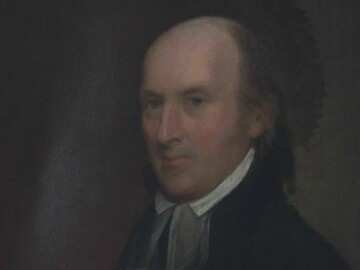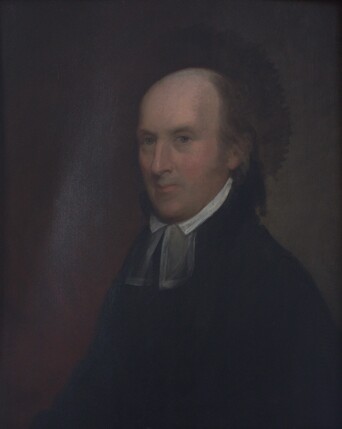Thanksgiving Sermon by Rev. Dr. Ezra Ripley, 1795
- Date
- 1795
- Material
- Paper, Sermon
- Author/Maker
- Reverend Ezra Ripley (1751-1841)
- Source
- Andover-Harvard Theological Library, Harvard Divinity School

Portrait of Rev. Dr. Ezra Ripley, oil on a wooden panel, circa 1810. Image provided courtesy of The Old Mase/Trustees of Reservation.
Description
Although Plymouth did not record another celebration like the one in 1621, harvest time thanksgivings began as smaller, community- or colony-based celebrations in Plymouth and the Connecticut River Valley during the 1600s and 1700s. Eventually, thanksgivings began to be called on a yearly basis "for the mercies of the year," and in the 18th century, New England colonists settled into the pattern of spring Fast Days and autumn days of thanksgiving. In 1795, Concord, Massachusetts minister Ezra Ripley pointed to the longstanding regional tradition in his Thanksgiving sermon.1
Transcription
With sentiments and emotions peculiarly respectful and pleasing, therefore, we meet and welcome this day, this anniversary thanksgiving, which we are called to celebrate in conformity to the religious custom of our pious ancestors. They early established this religious festival; they maintained it with pious care; and we, their descendents [sic], gratefully receive and joyfully imitate their laudable example.
Media

Portrait of Rev. Dr. Ezra Ripley, oil on a wooden panel, circa 1810. Image provided courtesy of The Old Mase/Trustees of Reservation.
Discussion Questions
- Compare this account of a thanksgiving celebration with the events of 1621. How has the celebration changed? How has it stayed the same?
-
What is Reverand Riply’s central idea for his sermon?
-
Identify the key words Reverand Riply uses to describe his thanksgiving celebration. What do these words tell us about how the event looked and sounded?
-
How does Reverand Riply use the 1621 harvest celebration to connect his audience with their past? As a writer, what do you think is his goal?
Footnotes
- 1 Ezra Ripley, "No. 890/Nov. 19, 1795 - Annual Thanksgiving" Sermon, Ezra Ripley (1751-1841) Sermons (1783-1799), Andover-Harvard Theological Library, Harvard Divinity School Repository, Cambridge, MA.